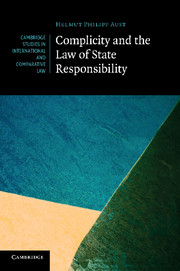Book contents
- Frontmatter
- Contents
- Foreword
- Preface
- Table of cases
- Abbreviations
- 1 Introduction
- 2 Complicity between bilateralism and community interest
- 3 Complicity and the international rule of law
- 4 Complicity in customary international law
- 5 The concept of complicity in Article 16 ASR
- 6 The consequences of complicity
- 7 Complicity and aggravated responsibility
- 8 A network of rules on complicity
- General conclusions
- Bibliography
- Index
Foreword
Published online by Cambridge University Press: 07 September 2011
- Frontmatter
- Contents
- Foreword
- Preface
- Table of cases
- Abbreviations
- 1 Introduction
- 2 Complicity between bilateralism and community interest
- 3 Complicity and the international rule of law
- 4 Complicity in customary international law
- 5 The concept of complicity in Article 16 ASR
- 6 The consequences of complicity
- 7 Complicity and aggravated responsibility
- 8 A network of rules on complicity
- General conclusions
- Bibliography
- Index
Summary
Until rather recently, ‘complicity’ was a marginal concept and a neglected issue in international law. The long gestation of Article 16 of the International Law Commission’s Articles on State Responsibility of 2001 did not attract much attention. According to this provision, ‘A State which aids or assists another State in the commission of an internationally wrongful act by the latter, is internationally responsible.’ However, after the terrorist attacks on 11 September 2001 and in connection with the invasion of Iraq in 2003, certain cooperative behaviour by States raised the general awareness of the possible responsibility of States for providing ‘aid and assistance’. This awareness, in turn, shed more light on other areas in which States cooperated in a way which raised questions about their implication in the internationally wrongful acts of other States. Today, barely ten years later, the possible responsibility for complicity is one of the most important and difficult issues which arise in the daily work of government legal departments.
This state of affairs alone would justify the timely publication of a monograph which carefully researches and analyses the relevant issues and practice. But the present book is much more than a solid synthesis of practice and the interpretation of an increasingly relevant rule of international law. Helmut Aust also situates this rule within the larger context of international law. He shows that the general prohibition of aid and assistance, as it is laid down in Article 16, is merely one element within a web of more specific primary rules. He also argues persuasively that this prohibition is an expression of a more general legal principle which would guide the interpretation of Article 16. Finally, he demonstrates that the position which international law adopts with respect to ‘aid and assistance’ is a highly significant symptom of its own state of development, perhaps as important as the concept of peremptory norms.
- Type
- Chapter
- Information
- Complicity and the Law of State Responsibility , pp. ix - xPublisher: Cambridge University PressPrint publication year: 2011

